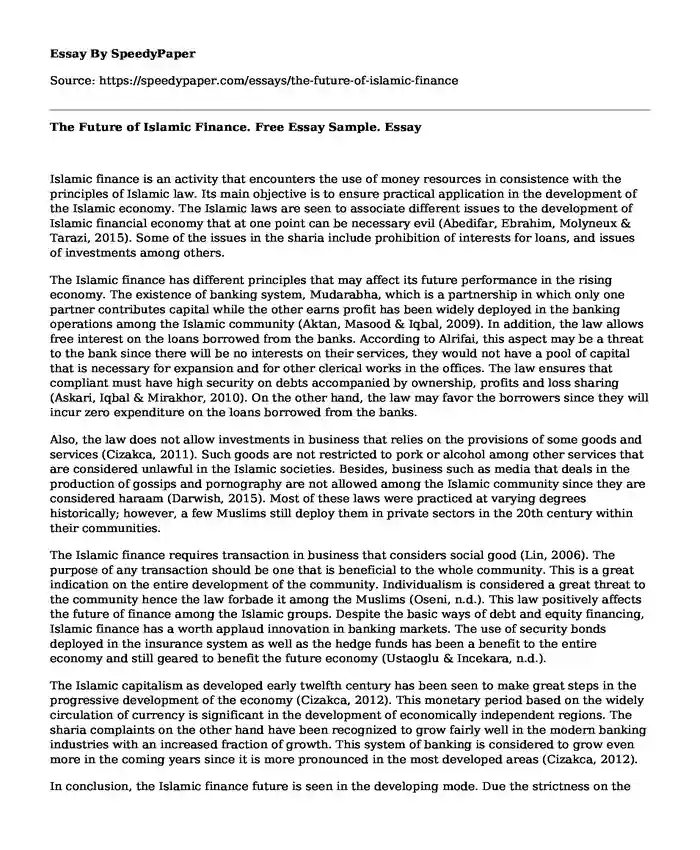Islamic finance is an activity that encounters the use of money resources in consistence with the principles of Islamic law. Its main objective is to ensure practical application in the development of the Islamic economy. The Islamic laws are seen to associate different issues to the development of Islamic financial economy that at one point can be necessary evil (Abedifar, Ebrahim, Molyneux & Tarazi, 2015). Some of the issues in the sharia include prohibition of interests for loans, and issues of investments among others.
The Islamic finance has different principles that may affect its future performance in the rising economy. The existence of banking system, Mudarabha, which is a partnership in which only one partner contributes capital while the other earns profit has been widely deployed in the banking operations among the Islamic community (Aktan, Masood & Iqbal, 2009). In addition, the law allows free interest on the loans borrowed from the banks. According to Alrifai, this aspect may be a threat to the bank since there will be no interests on their services, they would not have a pool of capital that is necessary for expansion and for other clerical works in the offices. The law ensures that compliant must have high security on debts accompanied by ownership, profits and loss sharing (Askari, Iqbal & Mirakhor, 2010). On the other hand, the law may favor the borrowers since they will incur zero expenditure on the loans borrowed from the banks.
Also, the law does not allow investments in business that relies on the provisions of some goods and services (Cizakca, 2011). Such goods are not restricted to pork or alcohol among other services that are considered unlawful in the Islamic societies. Besides, business such as media that deals in the production of gossips and pornography are not allowed among the Islamic community since they are considered haraam (Darwish, 2015). Most of these laws were practiced at varying degrees historically; however, a few Muslims still deploy them in private sectors in the 20th century within their communities.
The Islamic finance requires transaction in business that considers social good (Lin, 2006). The purpose of any transaction should be one that is beneficial to the whole community. This is a great indication on the entire development of the community. Individualism is considered a great threat to the community hence the law forbade it among the Muslims (Oseni, n.d.). This law positively affects the future of finance among the Islamic groups. Despite the basic ways of debt and equity financing, Islamic finance has a worth applaud innovation in banking markets. The use of security bonds deployed in the insurance system as well as the hedge funds has been a benefit to the entire economy and still geared to benefit the future economy (Ustaoglu & Incekara, n.d.).
The Islamic capitalism as developed early twelfth century has been seen to make great steps in the progressive development of the economy (Cizakca, 2012). This monetary period based on the widely circulation of currency is significant in the development of economically independent regions. The sharia complaints on the other hand have been recognized to grow fairly well in the modern banking industries with an increased fraction of growth. This system of banking is considered to grow even more in the coming years since it is more pronounced in the most developed areas (Cizakca, 2012).
In conclusion, the Islamic finance future is seen in the developing mode. Due the strictness on the law on what are considered to affect the entire economy, Muslims have shown a positive development of the economy. The bank values security and ownership on money lent to customers that the interest. This is paramount in taking care of the assets that defines the business. In addition, disposal of goods such as pork from the economy makes Muslims to concentrate on goods that are consumable by them hence an instance of profit. Therefore, the rules that govern finance among the Islamic societies have a brighter future in economy when they continue to be implemented in the economy.
References
Abedifar, P., Ebrahim, S., Molyneux, P., & Tarazi, A. (2015). ISLAMIC BANKING AND FINANCE: RECENT EMPIRICAL LITERATURE AND DIRECTIONS FOR FUTURE RESEARCH. Journal Of Economic Surveys, 29(4), 637-670. doi:10.1111/joes.12113
Aktan, B., Masood, O., & Iqbal, M. (2009). Development and future prospects of Islamic banking in Bangladesh. IJMEF, 2(3/4), 336. doi:10.1504/ijmef.2009.029067
Alrifai, T. Islamic finance and the new financial system.
Askari, H., Iqbal, Z., & Mirakhor, A. (2010). Globalization and Islamic finance. Singapore: John Wiley & Sons (Asia).
CIizakcIa, M. (2011). Islamic capitalism and finance. Cheltenham, UK: Edward Elgar.
AizakAa, M. (2012). Islamic Capitalism and Finance : Origins , Evolution and the Future. JIBM, 2(2), 183-189. doi:10.12816/0004984
Darwish, P. (2015). Strategies to Shape the Future of Islamic Financial risk Management and Takaful Insurance. Journal Of Islamic Banking And Finance, 3(1). doi:10.15640/jibf.v3n1a6
Lin, J. (2006). Review of Islamic Banking & Finance in South-East Asia: Its Development and Future. Asian Journal Of Comparative Law, 1(1). doi:10.2202/1932-0205.1022
Oseni, U. Dispute Resolution in Islamic Banking and Finance: Current Trends and Future Perspectives. SSRN Electronic Journal. doi:10.2139/ssrn.1461895
Ustaoglu, M., & IIncekara, A. Islamic finance alternatives for emerging economies.
http://mendoza.nd.edu/why-mendoza/news-and-events/speaker-series/ten-years-hence/archives/globalization-and-finance-the-future-of-islamic-finance-as-an-ethical-investment-summary/https://www.atkearney.com/documents/10192/654853/Future+of+Islamic+Banking.pdf/27167edf-a96d-4465-b88a-83beb25ed4bd
Cite this page
The Future of Islamic Finance. Free Essay Sample.. (2020, Apr 28). Retrieved from https://speedypaper.net/essays/the-future-of-islamic-finance
Request Removal
If you are the original author of this essay and no longer wish to have it published on the SpeedyPaper website, please click below to request its removal:
- Free Essay on Globalization and International Trade
- Essay Sample on Promoting Ethics in the Public Sector
- Essay Sample on Religious Freedom in America
- Free Essay on Organizational Determinants
- Free Essay: Review of Regulations and Standards for Surgical Site Infection
- Free Essay on Groundwater Arsenic in Chimaltenango, Guatemala
- Essay Example on Principles of Economics and Pension Accounting
Popular categories





